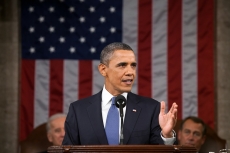The CPD Blog is intended to stimulate dialog among scholars and practitioners from around the world in the public diplomacy sphere. The opinions represented here are the authors' own and do not necessarily reflect CPD's views. For blogger guidelines, click here.

According to various public opinion polls, most of the world now has a vastly improved opinion of our president and our country.
Now that the big Asia trip is history, it’s natural to judge it on the basis of known results from its biggest portion — Obama’s three days in China. For the American president, there were no obvious breakthroughs on exchange rates or trade, climate or human rights, so maybe this visit was not the most successful. On the other hand, viewed in the context of America’s recent history with East Asia, there was a certain welcome absence of drama. Expectations were managed, there was no brinkmanship. Maybe that could be considered an achievement.
Yesterday, the Palestinian president Mahmoud Abbas (Abu Mazen) made a public statement accepting the call of the French president Nicolas Sarkozy for a Middle East peace conference and his offer to host this conference. In his statement, Abbas emphasized that a condition for holding the conference must be a total freeze of settlement expansion in the Palestinian territories.
An overseas trip by a U.S. president is always costly, logistically challenging, and full of colorful backdrops. President Obama’s trip to Japan, Singapore, China and Korea is no exception. If anything, there will be more excitement than usual, since it is his first trip to the region as President and there is still tremendous foreign public interest in this appealing, young, intelligent leader, his inspiring speeches, and his photogenic wife.
Why, then, is the mood so downbeat among the U.S. press corps — the “traveling press” — as they begin covering this trip?
CAIRO --- I’ve spent the past week in Syria, Qatar, and Egypt, primarily to proselytize about public diplomacy. In Syria, in a Damascus University lecture (carried by Al Jazeera Live) and a lengthy interview on Syrian National Television, I made the case that Arab states do an exceptionally poor job of conducting public diplomacy and that their standing in the global political community suffers as a result.
I recently returned from the Middle East where I was part of a three week Arab & American Business Fellowship.
Twitter has had a phenomenological influence on the international news media in the post-Iranian elections period in June 2009 onwards. Through the continuous 24 hour- cycle of tweets, the micro-blogging site was challenging the censorship applied by the Iranian government on all news media covering the confrontations following the re-election of President Mahmoud Ahmadinejad . After years of state monopoly and censorship twitter and other social media sites and applications are making governments more concerned over news.
This post was originally presented as a speech to the Taiwanese Ministry of Foreign Affairs in Taipei, Taiwan, on October 29, 2009, and is reproduced here with the permission of the author.
Pages
Visit CPD's Online Library
Explore CPD's vast online database featuring the latest books, articles, speeches and information on international organizations dedicated to public diplomacy.
POPULAR ARTICLES
-
January 29
-
January 20
-
December 17
-
January 28
-
December 15
Featured Blogger
Join the Conversation
Interested in contributing to the CPD Blog? We welcome your posts. Read our guidelines and find out how you can submit blogs and photo essays >.








